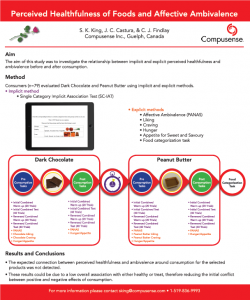Perceived healthfulness of foods and affective ambivalence
 Today’s consumers have access to more food choices and nutritional information than ever before. While trying to navigate grocery stores they are making regular decisions of what foods best suit the taste, nutritional, economic and environmental needs of their lifestyle. The present study looks at the relationship between consumers’ perceived healthfulness of foods and their affective ambivalence pre and post consumption. Where ambivalence is determined via the Positive and Negative Affect Schedule (PANAS) measuring the degree to which the subject expresses positive and negative attitudes simultaneously. Since cravings tend to cause consumers to be both drawn to and repelled by the object of their craving, the aim of this preliminary study is to investigate whether the perceived healthfulness effects ambivalence before and after consuming. Implicit measures have been used to uncover subconscious consumer opinions of brand and product categories. In this study, both implicit and explicit measures are used to determine subjects’ attitudes toward test product healthfulness. 79 subjects (aged 18+, mean: 41 yo., 43 male) participated in the study. During the recruitment process, subjects were asked to classify specific foods, including test products (dark chocolate and peanut butter), as “healthy” or “treat”, repeated at the end of the test. On the test day, subjects completed Single-Category Implicit Association Test (SC-IAT), PANAS and hunger/appetite tasks both before and after consuming each of the test products. Liking of the product category was also evaluated. Previous research by Hormes and Rozin (2011) investigated the temporal relationship of ambivalence in craved foods, finding that ambivalence is highest at the consumption decision point, which was not seen in this study. Methods described did not detect the expected connection between perceived healthfulness and affective ambivalence around consumption for the selected products. This could be due a small effect size but further investigation is required.
Today’s consumers have access to more food choices and nutritional information than ever before. While trying to navigate grocery stores they are making regular decisions of what foods best suit the taste, nutritional, economic and environmental needs of their lifestyle. The present study looks at the relationship between consumers’ perceived healthfulness of foods and their affective ambivalence pre and post consumption. Where ambivalence is determined via the Positive and Negative Affect Schedule (PANAS) measuring the degree to which the subject expresses positive and negative attitudes simultaneously. Since cravings tend to cause consumers to be both drawn to and repelled by the object of their craving, the aim of this preliminary study is to investigate whether the perceived healthfulness effects ambivalence before and after consuming. Implicit measures have been used to uncover subconscious consumer opinions of brand and product categories. In this study, both implicit and explicit measures are used to determine subjects’ attitudes toward test product healthfulness. 79 subjects (aged 18+, mean: 41 yo., 43 male) participated in the study. During the recruitment process, subjects were asked to classify specific foods, including test products (dark chocolate and peanut butter), as “healthy” or “treat”, repeated at the end of the test. On the test day, subjects completed Single-Category Implicit Association Test (SC-IAT), PANAS and hunger/appetite tasks both before and after consuming each of the test products. Liking of the product category was also evaluated. Previous research by Hormes and Rozin (2011) investigated the temporal relationship of ambivalence in craved foods, finding that ambivalence is highest at the consumption decision point, which was not seen in this study. Methods described did not detect the expected connection between perceived healthfulness and affective ambivalence around consumption for the selected products. This could be due a small effect size but further investigation is required.
![]()
King, S. K., Castura, J. C., & Findlay, C. J. (2017). Perceived healthfulness of foods and affective ambivalence. 12th Pangborn Sensory Science Symposium. 20-24 August. Providence, RI, USA.